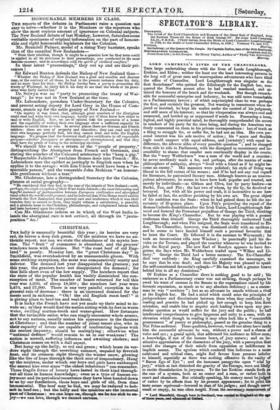CHRISTMAS.
THE holly is unusually beautiful this year ; its berries are very red, its leaves a deep rich green. Of the misletoe we have no au- thentic report, nor can we state the abundance of its mystic ber- ries. The " fruit " of commerce is abundant, and the grocers' windows teem with dainties. But "the roast beef of old Eng- land" is poorly. Monday last, the "great Christmas day" In Smithfield, was overshadowed by an unseasonable gloom. With some striking exceptions, the meat was comparatively scanty and inferior. The demand last year disappointed the graziers ; yet this year, the graziers have not disappointed the demand ; for that falls short even of the low supply. The butchers report that the state of the popular health has visibly diminished the con- sumption of meat. The number 'of beasts returned for toll this year was 4,250, of sheep 18,200 ; the numbers last year were 6,470, and 27,900. There is one very painful exception to the general rule of decrease : there is an increased demand for the meats used in sickness. "Oh ! the old English roast beef! " it is giving place to beef-tea and veal-broth.
It is lucky the French have not yet made up their mind to in- vade us; or they would find the nation sitting with its feet in warm water, swilling mutton-broth and water-gruel. How fortunate that the invincible sailor, who can singly encounter whole armies, not to say nations,. usually makes his appearance in the theatres at Christmas ; and that the number of primi tenori also, who in their capacity of lovers are capable of confronting legions with the coolest impunity, should be multiplying ; otherwise what "national defence" would remain to me in our weakness? The nation is unwell, suffering influenza and awaiting cholera; and Christmas comes on with a dull aspect.
But ham,-r' up the holly, so red and green ; which bears its ver- dure right through the scorching summer, unpaled by feverish heat, and its crimson right through the winter snow, glowing like the fire of hope through the thick mist of despondency. Hang up the misletoe, under which our boys and girls have exchanged the annual kiss ever since "the oldest inhabitant" can remember. These fragile forms of beauty have lasted in their kind through- but all time in human knowledge ; even as a type of human en- joyment and its periodical recurrence they have been handed down to us by our forefathers, those boys and girls of old, from time immemorial. The beef may be bad, we may be reduced to hob- nob in beef-tea ; but the holly and the misletoe are the immortal part of Christmas : we can hope on, though we be too sick to en- joy—we can love, though we cannot carouse.

























 Previous page
Previous page